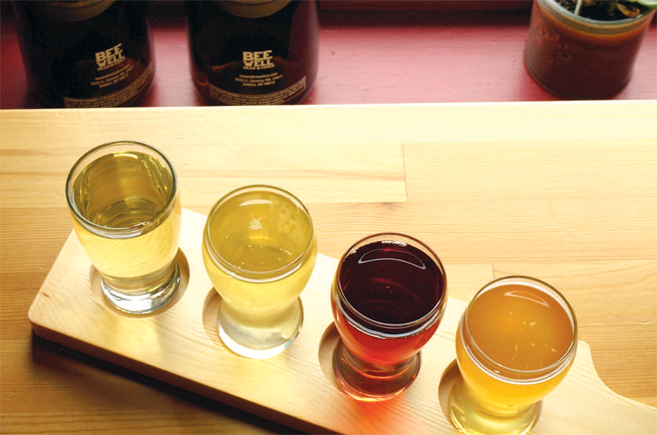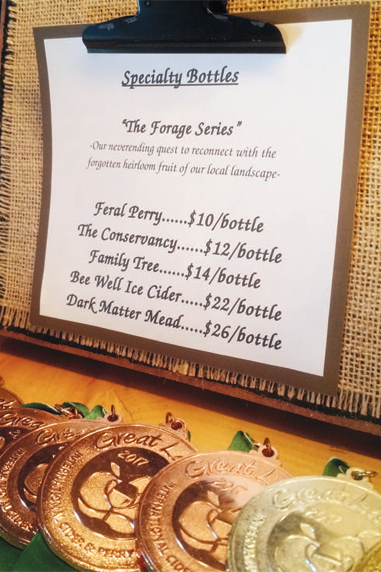Bee Well Meadery
Terroir is a word used in the winemaking world to express the influence of the environment on the outcome of the wine. Particularly the influence that the soil has on the plants, whose roots reach into the earth seeking nutrients for their fruit. The vintner who works with estategrown grapes learns to allow the expression of those plants and soils into the wine that gets poured in the glass.
So what kind of word could express that same notion in a drink made from honey that comes not from roots dug deep in a particular soil but from the bees that range free over the land, wherever flowers bloom and pollen is abundant?
There is no such word yet, but if you were to visit Bee Well Meadery you would find a family engaged deeply in the business of expressing the taste of their home county— the air, the lakes, the fruits, flowers and even the people—in every glass of honey mead and hard cider that they produce.
Bee Well Meadery is in Bellaire, a town perhaps best known as home to the Short’s Brewing empire. Indeed, proximity to Short’s has occasionally helped people discover this little place that sits on the outskirts of town, as overflowing crowds look to explore their options while waiting for a table at the brewery.
What visitors find as they walk into the tasting room is a distillation of Antrim County. For starters, there will likely be one or more of the family members involved in the meadery greeting you or working in the back. The Van Sice family goes back five generations in the area and the siblings who started and run it were born and raised surrounded by the waters of Clam Lake, Torch Lake and Lake Bellaire.
Chris and Jeremy Van Sice are the brewing brothers who started it all. Avid home brewers of almost anything you could ferment, they eventually set their sights on starting their own business. In the early days they were raising their own honey and enjoying results of their meadmaking, and decided to let that lead the way. In order to get going, they launched a Kickstarter campaign, largely to invest in the well and septic needed. Their original goal of $9,000 was met with over $14,000 in support from the community, an amount that funded additional equipment to help get them off to a smooth start. They made their first retail sales in 2014.
Their brother Parker began helping with the mechanical side of the operation, and as production and sales got under way, the brothers leaned on their sister Paige, who had moved to Oregon, to join them. She returned home and got to work on marketing and sales for the meadery’s expanding line of bottled meads and ciders.
Those first two years were filled with the usual growing pains of a fledgling business. Paige’s sales took care of the inventory to date and then some, creating demand that sometimes went unfilled until production could catch up.
There was also a steep learning curve in the production side, but Paige credits the cider-making industry of Michigan for helping them through. “The people in the Michigan cider scene are really take-youunder- their-wing people. We got a lot of help from the cidermakering community.”
Eventually that seesaw effect of supply and demand smoothed out. Retail sales were good and growing across the state. Customers, especially locals, started asking for a tasting room, a place they could go and just enjoy a flight, a glass, or two. So the meadery’s small production facility moved to its current location on Derenzy Road, with a glass wall onto the new tasting room that not only gives customers a connection to production but seems to work the other way as well, giving the brewers a sense of who’s come to visit. During my recent trip, Jeremy came out to chat with a couple who had stopped by for the first time. They shared a bit of their enthusiasm for cider and learned about the New England–style cider that Jeremy hopes to release this coming season.
In the tasting room there are several small tables, a bar with a lovely cordwood face and a window onto the parking lot bringing light into the cool and cozy room. Fruity art and designs with bees adorn the walls and chalkboards offer the drink listings. These days, production is more or less equally split between meads and ciders, and all are available as a flight, by the glass or in bottles to go.
Wanting to focus more on meadmaking than beekeeping, the original family beehives now produce honey for the farmers’ market and the meadery buys Antrim County honey in bulk from a larger local beekeeper. Best thought of as wildflower honey, the bees in the area rely heavily on star thistle plants but range all over on anything in bloom. The mead is produced “more like a tea than anything,” says Paige. Each 150-gallon batch starts with 20 pounds of honey, then the other fruits and flavorings are steeped in the brew. The signature flavors are Cherry Vanilla, made with King Orchard cherries, and Peach Ginger from Michigan peaches.
Traditionally, meads can come in all shapes and sizes. Sweet or dry, wine- or cordiallike, or more like a cider—which is how they are popularly produced these days. Lightly effervescent and coming in with 6.9 percent alcohol, these meads are fermented out to dry then flavored and sweetened back with fruit. They are smooth feeling with a sense of nectary goodness and are somewhat sweet without being cloying—the carbonation helps with that, as does the selective addition of spice or tart fruit.
On the cidery side of things, Bee Well works with several long-standing orchards in the county with names familiar not only to residents but anyone who drives through the region noticing farmstands and looking for pie. King Orchards, Farmer White’s and Bargy’s Farm have all been pleased to become named sources of apples for this growing beverage enterprise. Cider provides an excellent market for their abundant Empires, Cortlands and Northern Spys which have in turn become the base of Bee Well’s recipes. And, as production has grown and pushed the crush capacity of the meadery to its limits, at least one of the farms is helping out—and adding value to its own product—by investing in a press and selling juice as well as apples.
The regular lineup of ciders includes King’s Hard Cider, King’s Cherry, Antrim Apple Pie, White’s Harvest and Bargy’s Blend (with honey).
Other blends and recipes are always brewing in the mix, as Bee Well explores what it means to be locally based, to bind more deeply with its community and to expand their brewing experience and product line. The Forage Series includes Feral Perry, made mostly from wild and abandoned pears that have been found on farms and family properties around the county. Family Tree Cider comes from an invitation to the community to bring in their apples and press them together to create a communal batch. And there’s Dark Matter Mead, an all-berry mead aged for three years and now reminiscent of a Cabernet wine.
In the production area that I was able to explore briefly with brewer Chris, there is a batch from last fall patiently awaiting bottling: the result of brewer Jeremy’s trek last year to Beaver Island to collect from feral and abandoned old trees, some dating as far back as the notorious religious leader Strang’s days when apples were meant for the cider barrels. Jeremy loaded up 60 crates then and headed home in the van via the four-hour ferry ride. That Beaver Island cider now just waits for a break in the action long enough for it to get bottled, but all who’ve been tasting it have been very pleased with the result.
So, I ask, will Jeremy repeat the trip again this year? Chris and Paige both shrug, nod and, with a little eye-roll particular to siblings in business together, say “Yeah. Yeah, I’m sure he will.”
IF YOU GO:
Bee Well Meadery
3533 S. Derenzy Rd., Bellaire, MI
Info@BeeWellMeadery.com
Find current hours Facebook






